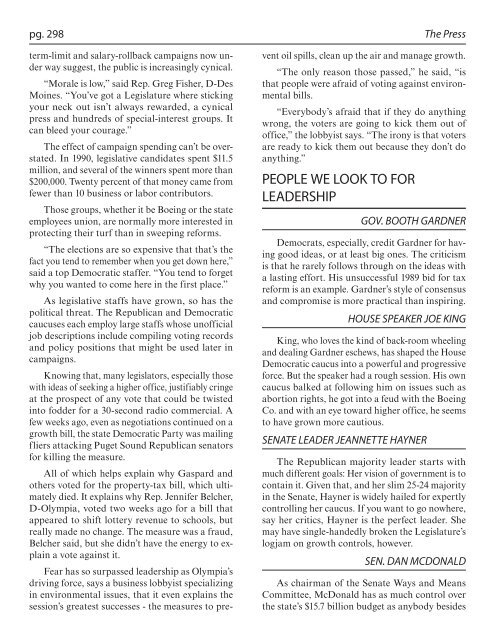Helen Sommers: An Oral History
Helen Sommers: An Oral History
Helen Sommers: An Oral History
Create successful ePaper yourself
Turn your PDF publications into a flip-book with our unique Google optimized e-Paper software.
pg. 298 The Press<br />
term-limit and salary-rollback campaigns now under<br />
way suggest, the public is increasingly cynical.<br />
“Morale is low,” said Rep. Greg Fisher, D-Des<br />
Moines. “You’ve got a Legislature where sticking<br />
your neck out isn’t always rewarded, a cynical<br />
press and hundreds of special-interest groups. It<br />
can bleed your courage.”<br />
The effect of campaign spending can’t be overstated.<br />
In 1990, legislative candidates spent $11.5<br />
million, and several of the winners spent more than<br />
$200,000. Twenty percent of that money came from<br />
fewer than 10 business or labor contributors.<br />
Those groups, whether it be Boeing or the state<br />
employees union, are normally more interested in<br />
protecting their turf than in sweeping reforms.<br />
“The elections are so expensive that that’s the<br />
fact you tend to remember when you get down here,”<br />
said a top Democratic staffer. “You tend to forget<br />
why you wanted to come here in the first place.”<br />
As legislative staffs have grown, so has the<br />
political threat. The Republican and Democratic<br />
caucuses each employ large staffs whose unofficial<br />
job descriptions include compiling voting records<br />
and policy positions that might be used later in<br />
campaigns.<br />
Knowing that, many legislators, especially those<br />
with ideas of seeking a higher office, justifiably cringe<br />
at the prospect of any vote that could be twisted<br />
into fodder for a 30-second radio commercial. A<br />
few weeks ago, even as negotiations continued on a<br />
growth bill, the state Democratic Party was mailing<br />
fliers attacking Puget Sound Republican senators<br />
for killing the measure.<br />
All of which helps explain why Gaspard and<br />
others voted for the property-tax bill, which ultimately<br />
died. It explains why Rep. Jennifer Belcher,<br />
D-Olympia, voted two weeks ago for a bill that<br />
appeared to shift lottery revenue to schools, but<br />
really made no change. The measure was a fraud,<br />
Belcher said, but she didn’t have the energy to explain<br />
a vote against it.<br />
Fear has so surpassed leadership as Olympia’s<br />
driving force, says a business lobbyist specializing<br />
in environmental issues, that it even explains the<br />
session’s greatest successes - the measures to pre-<br />
vent oil spills, clean up the air and manage growth.<br />
“The only reason those passed,” he said, “is<br />
that people were afraid of voting against environmental<br />
bills.<br />
“Everybody’s afraid that if they do anything<br />
wrong, the voters are going to kick them out of<br />
office,” the lobbyist says. “The irony is that voters<br />
are ready to kick them out because they don’t do<br />
anything.”<br />
PEOPLE WE LOOK TO FOR<br />
LEADERSHIP<br />
GOV. BOOTH GARDNER<br />
Democrats, especially, credit Gardner for having<br />
good ideas, or at least big ones. The criticism<br />
is that he rarely follows through on the ideas with<br />
a lasting effort. His unsuccessful 1989 bid for tax<br />
reform is an example. Gardner’s style of consensus<br />
and compromise is more practical than inspiring.<br />
HOUSE SPEAKER JOE KING<br />
King, who loves the kind of back-room wheeling<br />
and dealing Gardner eschews, has shaped the House<br />
Democratic caucus into a powerful and progressive<br />
force. But the speaker had a rough session. His own<br />
caucus balked at following him on issues such as<br />
abortion rights, he got into a feud with the Boeing<br />
Co. and with an eye toward higher office, he seems<br />
to have grown more cautious.<br />
SENATE LEADER JEANNETTE HAYNER<br />
The Republican majority leader starts with<br />
much different goals: Her vision of government is to<br />
contain it. Given that, and her slim 25-24 majority<br />
in the Senate, Hayner is widely hailed for expertly<br />
controlling her caucus. If you want to go nowhere,<br />
say her critics, Hayner is the perfect leader. She<br />
may have single-handedly broken the Legislature’s<br />
logjam on growth controls, however.<br />
SEN. DAN MCDONALD<br />
As chairman of the Senate Ways and Means<br />
Committee, McDonald has as much control over<br />
the state’s $15.7 billion budget as anybody besides
















